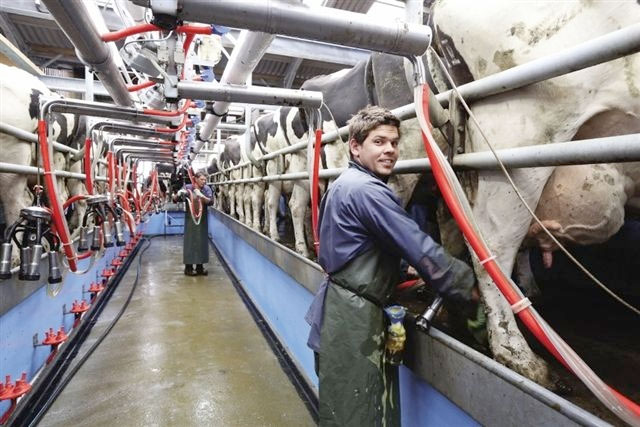
In the wake of very gloomy times ahead for British dairy, Farmers for Action have organised a series of crisis meetings which senior figures in the NFU have described as meaningless.
"As predicted milk prices came crashing down thanks to none other than the infamous farmer owned co-op, First Milk by a whooping 3ppl. The word on the street is that they haven't finished yet. Where is the statement to explain to everybody in the dairy industry who gets affected by this dramatic drop?", FFA Chairman David Handley asked.
"Still no answers from processors or retailers as to why the UK is taking such dramatic price drops when we are importing 40% of some dairy products we consume and 80% of what we produce is used within this country. Surely now the whole of the dairy industry on the producer side need to get together and demand, not ask, for answers.
"Where is all this money going? Most dairy farmers now will have had 5ppl wiped off their standard litre price, even the very clever must now be starting to get concerned, although one clever large scale Scottish producer informs us it will be ok in 15 months time, when the little ones have gone, here will be a bonanza for the big boys who are left."
Handley will speak at the organised meetings which will commence today in the Frome Auction Centre. Another will be held in Market Dreyton in one week.
Recently, dairy farmers are having to deal with the current ban by Russia on EU produce. A series of key meetings involving European dairy industries, government bodies and the European Commission will be held in the next month to address the Russian import ban on dairy products.
Rural accountants Old Mill said the likely impact of milk quotas being abolished next spring is still difficult to predict, with the potential for both increased imports from Ireland and greater export opportunities to the Asian market.
“With UK milk production running 5% ahead of last year, as well as strong production in the EU, US and New Zealand, global dairy commodity prices are already under pressure,” said head of rural services Andrew Vickery.
DairyCo’s Actual Milk Price Equivalent, based on a basket of commodity prices, was pegged at 30.9p/litre in July – 8.9p/litre down on the same time last year, he adds. “If this downward trend in commodity markets continues then there will no doubt be pressure on the processors to drop milk prices further.”
That in itself is not necessarily a bad thing, provided that costs can be reduced by at least the same level. “Feed prices should be lower this winter – and the good weather of recent months should help to keep dairy farmers’ costs down as well,” said Mr Vickery.
The effect of the strengthening pound in recent months will also have an effect on the market. “Imported commodities – notably proteins like soya - are likely to get cheaper, while putting further pressure on UK arable exports. However, there will equally be pressure on dairy exports, and imported dairy commodities will become more competitive.”
Shadow Agriculture Minister Llyr Gruffydd AM has called on the Welsh Government to act in response to deepening difficulties in the milk sector.
Speaking after a series of meetings in Brussels with EU officials and farming union representatives as well as dairy farmers and milk processors in Wales, the Plaid Cymru Assembly Member said:
“This could be the first real test of the new team of Ministers responsible for agriculture in Wales. It is clear that the dairy sector faces a protracted period of price volatility. Global prices are dropping with the Russian trade embargo making things considerably worse. In addition, the end of milk quotas next year along with the push for increased milk production in Ireland will all have a bearing on prices here.
“The Welsh Government must bring forward a strong package of support for the industry, including consideration of establishing a dairy equivalent to Hybu Cig Cymru / Meat Promotion Wales to more effectively promote and market Welsh milk.
“Funding through the Wales Rural Development Programme and other sources must be used to develop supply chains that can minimise the volatility faced by the sector. We also need to re-double efforts to encourage local processing of more added value produce.
“Encouraging procurement policies that better support the Welsh dairy sector should also be a key priority of government and other public bodies. New EU procurement rules for example will have a greater emphasis on environmental considerations. Sourcing local milk and dairy produce could therefore benefit everyone.
“Supermarkets must also play their part and not use the price drop to increase their margins. During the horsemeat scandal the supermarkets made promises to support the farming industry and this is an opportunity to show they are true to their word.”
Mr Gruffydd also said there was room to strengthen the voluntary dairy code to better protect farmers.
“Whilst I understand the need to strike a balance between protecting suppliers and allowing processors to be sufficiently responsive to the markets, the fact that 12 EU countries now provide for compulsory contracts suggests it should be considered again.”
Plaid Cymru has also welcomed the EU’s Private Storage Aid measures and supported calls from the farming unions that their storage should not be limited to seven months. It also wants the stored produce gradually re-introduced to the market to lessen any potential adverse impact.
Finally, the Party of Wales wants any EU budgets originally earmarked for promotion of produce in Russia to now be invested in developing new markets elsewhere
In the last week Mr Gruffydd has met with dairy farmers in Carmarthenshire, visited the Dairy Development Centre at Gelli Aur, met representatives of First Milk at their Haverfordwest facility in Pembrokeshire, held discussions with FUW and NFU representatives and held talks with European Commission representatives and MEPs during a visit to the European Parliament in Brussels.
